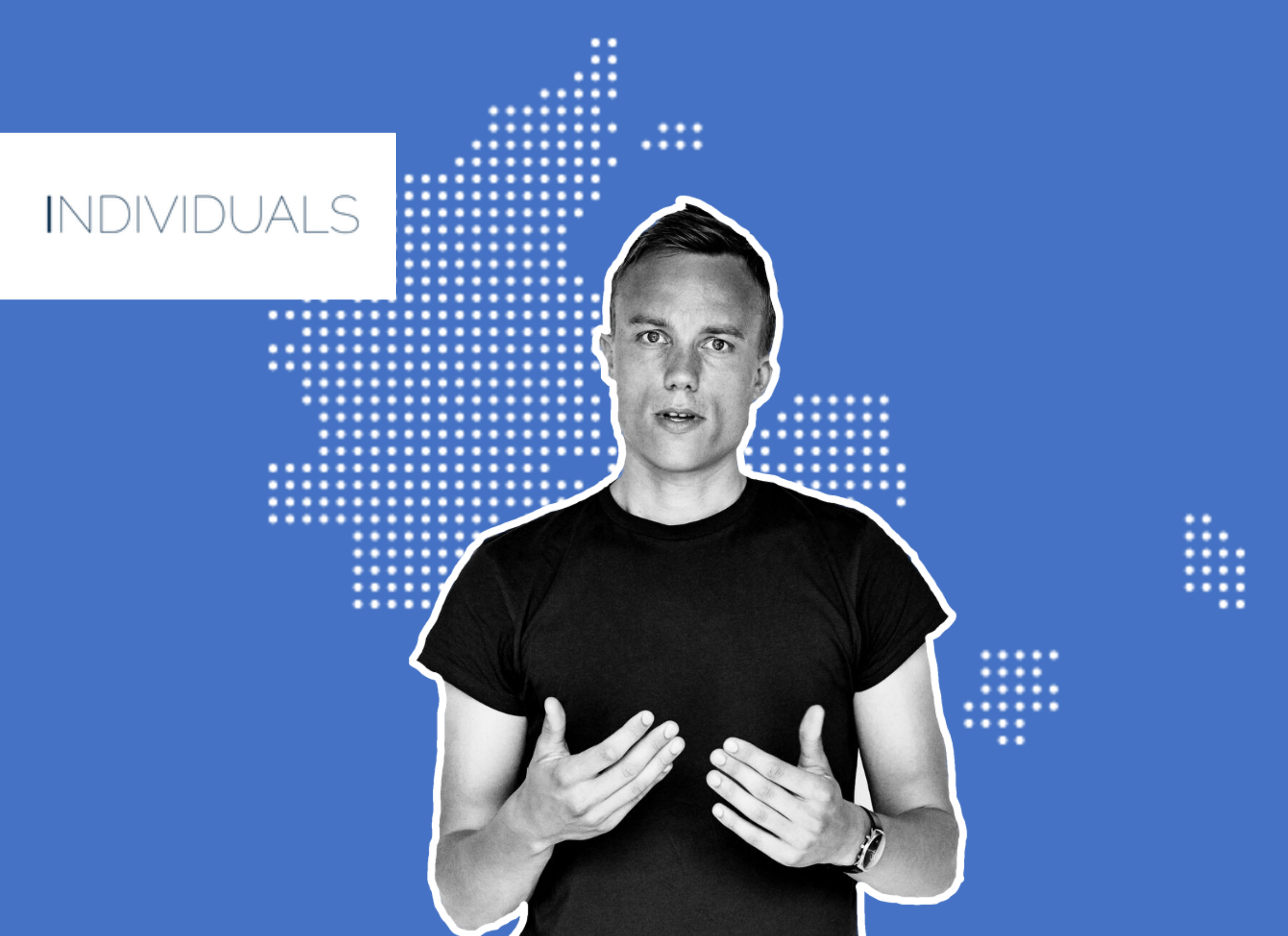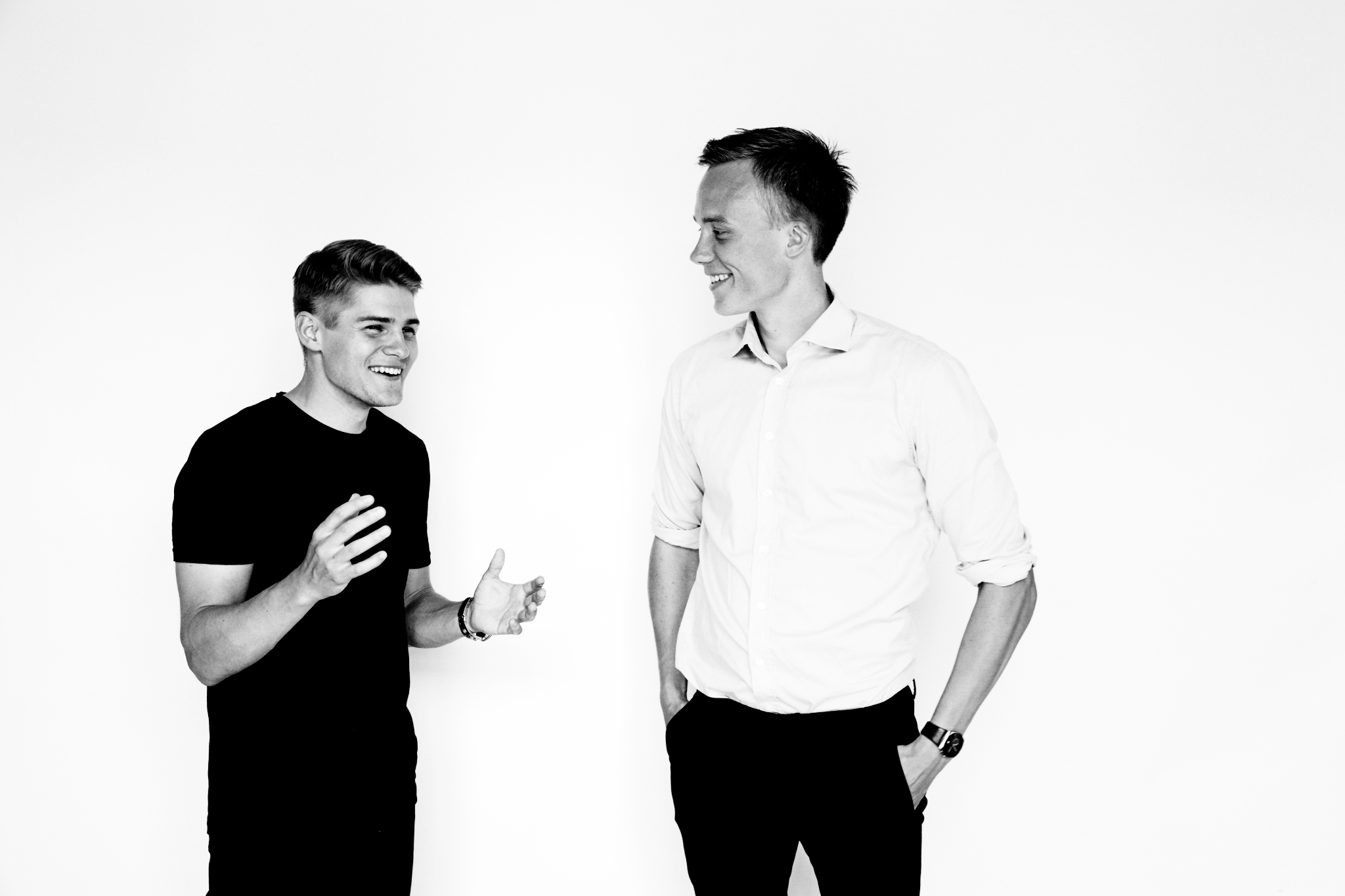
Today, Johan is CEO & partner in INDIVIDUALS, a company he operates with 4 other partners. They focus on supporting companies developing internal talent and ensure that the individuals understand their potential through 1:1 sessions, workshops and assessments.
Johan has not taken the ‘classical’ career path. After he ended high-school with a 5.4-grade point average he has managed to carve his way by being proactive and seeking out challenging opportunities outside the school system. We sat down with Johan to get his perspective on how to build a career early on and what skills he believes are essential to acquire as you kick-off your career!
Like a lot of other teenagers finishing high-school Johan was sure that University would be the right path for him.
“Unfortunately I had spent a lot of time and energy in high-school playing high-level football which conflicted with the requirements to get high grades. I ended up with a 5.4 grade average. Therefore, my options were limited, and I ended up getting accepted into RUC on their SamBas studies. Quickly, I lost interest in the topics and felt that the general level was quite low during the lectures which were quite frustrating.”
Johan decided to drop out and started working in a full-time service job changing doormats in Jutland. After 1,5 year he also lost interest in that. Luckily a friend’s dad could see that he had a lot of energy and was very keen on learning new things. He got Johan involved with COOP (Supermarket) and he did some projects with them. The job with COOP led him to a contract with Red Cross.
“I got in contact with Red Cross about promoting Nephew as part of their yearly youth collection campaign. The event was a great success and I ended up working with them for 3 years despite not having graduated the university.”
“In 2015 I got the idea for Individuals together with some friends. Our idea was to provide career guidance to especially young individuals who are trying to navigate their careers which is normally done by people who is older than you. Early on we got a lot of friends and acquaintances to come by and try our framework and setup. We slowly start to build up a reputation and we started to see that there is a need for the large companies to be able to offer this kind of service for their employees. One of our earliest clients was Maersk, but we have worked with many of the largest brands in Denmark and abroad today.”
Johan believes that the tangible results from the sessions are what attract the companies to use Individuals.
“The big value proposition of our product is that the companies can see a tangible difference in the employees’ desire to stay in the companies after having talked to us about some of the challenges they face. Instead of e.g. changing their jobs we can help them discuss their issues and ensure they have the tools to solve them by themselves. And if they decide to change their job the manager can be curtain to know the reason why.”
Today INDIVIDUALS consists of 5 partners and have clients in primarily Denmark and China.

Photo: Andreas Houmann
What is your best advice to graduates who are looking to land their first full-time job?
“First and foremost I have seen a tendency among graduates that they are afraid that the first job is defining what they should do for the rest of their careers. This is of course not true since you can always change direction at a later point if you find out it was not the right thing for you or if a better opportunity appears.”
Johan believes that patience is an important skill to have when landing the first full-time job.
“I would urge new graduates to stay a bit longer in their roles and not always have the need to constantly change roles and companies. Nowadays you see many young professionals who are in desperate need to try something new after 8 – 12 months, but from my experience, a lot of the benefits actually only start to appear after you have been in the same role and the same company for a sustained time. One of the key things you develop over time is the network which is only attainable over time and will be extremely valuable for the rest of your career. So it’s not a downside that you have been in the same company for many years (2 – 5) on the contrary, I think it’s something that companies will value.”
“I have also seen a tendency that graduates and young professionals with a few years experience only are looking for management positions. I think this is a mistake and a bad tendency, that management experience is the key thing in the early years of your career. It’s important that when you become a manager you have had the required training and exposure to leading people. That is not something which is easy and it should only come after having spent many years as an individual contributor.”
Finally Johan encourages that student aim to get a part-time position during their studies.
“It’s by far the easiest way to land a graduate job and will position you nicely as the company will be familiar with your work. It can be tough to get the first job out of university and a student job can be a real differentiator.”
What skills do think are the most important ones in the first 5 years of your career?
“In general, I think the most important thing is to gain as much work experience as possible in the early stage of your career. So just having a full-time job is probably the key thing in my opinion.”
“Concerning graduate jobs specifically then I have seen some individuals struggle with the transition from being a graduate to becoming a ‘normal’ full-time employee. It can be difficult to go from being the center of attention as part of the graduate program to suddenly just being one of the many.”
In terms of competencies Johan points to the following three as the key ones:
If you could give your younger self advices what would they be?
“Personally speaking I would have liked to have not been too high-level so early on in my career. Due to my role as a founder and CEO of Individuals, I have had to focus a lot of my attention on delegating tasks and managing people instead of learning the craft myself. Today I’m good at telling other people how I want the excel sheet to look like or how I want the PowerPoint Presentation structured, but I can’t do it myself – at least not fast.”
Johan also highlights international experience as a key experience/skill to gain early on in someones career.
“I would also recommend getting experience abroad as soon as you can. Especially early on in your career or while you are studying as you will learn a lot both professionally and a person. I regret not going to NYC while I was still in my early 20ies and working on a coffee bar or similar, just to get the exposure to another country and culture.”

Photo: Andreas Houmann
What has been your biggest professional challenge and how did you overcome it?
“One of the most difficult things for me has been to start a business with people I also consider some of my closest friends. I think you are automatically jeopardizing the friendship when you gather in a business because you never know how it will develop. We were originally 4 friends who started the company and today we are 2 left. The two other founders left for different reasons, but it became clear along the way that they had different expectations in terms of how much they should work and contribute.”
Working with friends can be very tough, but it is also something Johan learned a lot from. Whilst he may not recommend it to other people, he does think it help him mature in some ways.
“It was a very tough time and some very tough conversations, but it is something I have learned a lot from and I would definitely be able to deal with it better today than back then.”
“I’m also not sure that not finishing my university education was the right thing to do. Sometimes I wonder if it would have made it easier for me and given me a clearer path in terms of my professional life.”
“But in general I think we are very spoiled in Denmark and we need to take more chances in our life.”
What would you focus on to ensure you select the right Graduate Programme? How do you know which one is the right one?
“I think it’s important to speak with your network and people you know at the companies. To understand what the company is like to work for from the inside.”
“Some of the key things you need to consider on a personal level are whether or not you are willing to travel away from family and friends for parts of the duration of the graduate program. Being away for 6-8 months might not be for everyone so that’s important to make your mind clear before applying for the program.”
“You also need to consider if you want to have multiple rotations during the program or if you prefer to be in the same role for a longer period of time. All of these things are super important to consider, but as per my earlier comments then I still think that you should not be afraid of making incorrect decisions. Sometimes going through hard times can actually be very valuable and teach you a lot about yourself.”
How do you think companies can make themselves more attractive towards graduates?
“I think it’s important that you stay true to your values and your beliefs. You shouldn’t try to ‘speak’ the young people’s language or change what you stand for as a company to attract them.”
“In general then it’s about feeling appreciated, salary/other benefits and development opportunities that reflect the individuals ambitions – those are the key ingredients in my world.”

Photo: Andreas Houmann
What would your advice be to someone who might not have received the best grades?
“In that case, I think you must have a student job during your studies. Being able to show that your grades do not reflect you as a person and a professional is super important, as you are not likely to make it through the CV screen with very bad grades. Furthermore you should consider not searching for top tier companies since their first selection criteria is your grade average.”